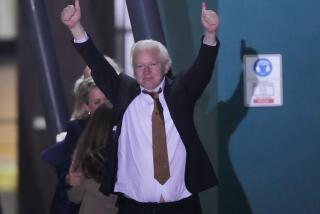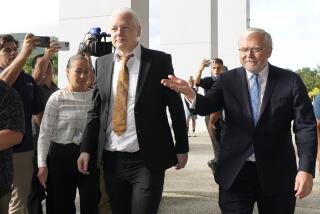Assange tried to warn White House about big classified documents leak, defense lawyers say
- Share via
LONDON — Julian Assange frantically tried to warn the White House that thousands of unredacted classified diplomatic cables were about to be released on the internet, his lawyers told a London court Tuesday on the second day of the WikiLeaks founder’s extradition hearing.
Instead of recklessly releasing the cables containing the names of secret sources, lawyers said, Assange and his colleagues at WikiLeaks tried to block them from becoming freely available to prevent lives from being put at risk.
“This is an emergency,” Assange and his WikiLeaks colleague Sarah Harrison said when they called the U.S. secretary of State’s emergency phone line, according to lawyer Mark Summers. ”It’s a matter of urgency. Real urgency.”
Summers said that after failing to get through to then-Secretary of State Hillary Clinton’s staff, he tried to call the U.S. ambassador in Britain, citing a “very large emergency” and asking: “Can you escalate it?”
“I don’t understand why you’re not seeing the urgency of this. Unless we do something, then people’s lives are put at risk,” the WikiLeaks team told the operator, according to Assange’s lawyers.
Assange, 48, is fighting extradition to the U.S., where he is facing 18 charges that he conspired with Army intelligence analyst Chelsea Manning to release classified documents to the world.
Lawyers for Assange said the U.S. government’s claims that Assange solicited information from Manning via a “most wanted leaks” list was an “absolute fantasy.” They also refuted the U.S. government’s charge that Assange helped Manning to hack into government databases.
“One could accurately describe this chapter of the case as lies, lies and more lies,” Summers said.
Lawyers for the U.S. government hit back, saying those were “simply absurd” allegations “that should not lightly be made.” They also rejected claims they were seeking to ratchet up the charges against Assange.
“We have a clear, unequivocal and legal basis for charging him, and that’s the end of it,” lawyer James Lewis said.
The indictment against Assange describes the leak as “the largest compromise of classified information in the history of the United States.”
In an effort to paint Assange as an investigative journalist fighting for free speech and exposing war crimes, Assange’s lawyers said the archive of documents has “altered the world we live in.”
“It has altered the court of human rights litigation,” Summers said. “It has caused oppressive governments to fall.”
However, on Monday, lawyers representing the U.S. government said Assange could not hide behind the guise of a journalist and was guilty of “pure criminality” for the hack and recklessness for the release of sensitive cables without redacting the names of sources in Afghanistan and Iraq who were providing intelligence to the U.S. and its allies. Some of those sources subsequently “disappeared,” the court heard.
Summers said these allegations were knowingly wrong and misleading.
“It’s difficult to conceive of a clearer example of an extradition request that boldly and blatantly misstates the facts as they are known to be to the U.S. government,” Summers said.
He said WikiLeaks did not rush to publish the cables once it obtained them in April 2010.
Instead, Assange partnered with news organizations including the Guardian, the New York Times and Der Spiegel to release the cables in an orderly, safe manner later that year. He also carefully worked with their journalists to ensure identities in the cables were protected, even involving people in the U.S. government who were “feeding redactions into the media partnership,” Summers said.
But a Guardian journalist published a book in February 2011 titled: “WikiLeaks: Inside Julian Assange’s War on Secrecy,” which contained the 58-key password to unredacted copies of the cables, enabling them to become freely accessed to the public online, Assange’s lawyers said.
“The gates got opened not by Mr. Assange or WikiLeaks but by another member of that [media] partnership,” Summers said. “The notion that Mr. Assange deliberately put lives at risk by dumping an unredacted database of cables is knowingly inaccurate.”
The Guardian denied the claim Tuesday.
“It’s a complete invention that I had anything to do with Julian Assange’s own publication decisions,” said the paper’s former investigations editor David Leigh, who co-wrote the book. “His cause is not helped by people making things up.”
Assange sat calmly throughout the testimony, listening intently and speaking to this legal team during the breaks. The sound of his supporters chanting demands for his freedom outside the courtroom could sporadically be heard, and the judge offered to adjourn briefly if they became too disruptive.
But by midafternoon, Assange was visibly struggling to follow the court proceedings. He repeatedly closed his eyes, covered his mouth to stifle several yawns and appeared to be falling asleep at times. The judge stopped proceedings to check if he was able to continue, and a member of his legal team spoke to him.
“Mr. Assange is struggling,” she said. “He’s finding it hard to concentrate. He can’t communicate with his legal team. He’s finding it very difficult.”
Before the day’s testimony got underway, Assange’s lawyer Edward Fitzgerald also sought help from Judge Vanessa Baraitser regarding his client’s treatment in Belmarsh prison which, he said, risked his right to a fair trial. He said Assange was handcuffed 11 times and stripped naked twice, and his legal documents were taken from him after the first day’s hearing. He was also put in five different cells during the day, he said.
“There is a risk that treatment of his nature will impinge on the proceedings … his preparedness in being able to participate in these proceedings,” Fitzgerald said.
The judge said that his lawyers would need to speak to prison authorities but she expected his rights to be upheld.
“I think everyone in the court supports a fair hearing,” she said.
Lawyers for the U.S. government said they supported this decision and “trenchant comments” should be made to the head of the prison.
If Assange is extradited to the U.S. and found guilty, he could face up to 175 years in prison.
Assange, an Australian citizen, is being held in Belmarsh prison after being removed from London’s Ecuadorian Embassy in April. He had been living there since 2012 with political asylum but was forcibly removed and arrested in April by British police on bail violations when that diplomatic protection was withdrawn.
He was facing sexual assault allegations in Sweden at the time, which he consistently denied. The charges were eventually dropped.
The extradition hearing, which is expected to last the week, seeks to determine if Assange’s extradition is legal under the terms of a U.S.-U.K. treaty.
An additional three-week hearing is scheduled for May when witnesses will be called.
Boyle is a special correspondent.
More to Read
Sign up for Essential California
The most important California stories and recommendations in your inbox every morning.
You may occasionally receive promotional content from the Los Angeles Times.










